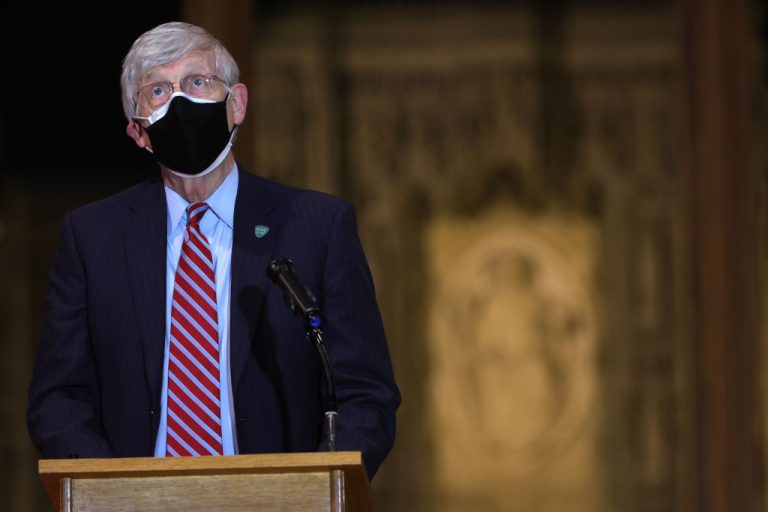A Director for the National institute of Health (NIH) says officials are investigating more than 500 “scientists of concern” working on federally funded research institutes and at academia who have troubling connections to the Chinese Communist Party (CCP).
NIH Deputy Director for Extramural Research, Dr. Michael Lauer, made the revelations on April 29 in testimony before the Senate Committee on Health, Education, Labor, and Pensions, which focused on the issue of protecting American biomedical research from foreign actors.
Lauer’s statements come as the nation is grappling with Chinese espionage that seeks to steal American research and technology for the benefit of the CCP. He revealed several scientists had lied to their respective American institutions and the NIH in declarations stating they spend 100 percent of their time in the United States. Lauer’s team found that in reality, almost 50 to 60 percent of their time was spent in China.
“I think one big problem, Senators, is that the threat is significant…We have identified over 500 scientists of concern…Each of these require a tremendous amount of work to figure out what exactly has been happening and to work carefully with the institution to figure out what’s going on…As of April 2021, we have contacted more than 90 awardee institutions regarding concerns involving over 200 scientists,” Lauer said at the hearing.
He added that more than 100 scientists have been removed from the NIH ecosystem. He also cites three major areas of concern where foreign governments might seek to unduly influence U.S.-supported researchers and exploit collaborative biomedical research.
- Some researchers at institutions funded by the NIH have not disclosed contributions received from other organizations, such as businesses and foreign governments;
- Proprietary information produced by NIH-supported biomedical research or in grant applications is being diverted to other nations and entities; and
- Some peer reviewers have failed to maintain confidentiality of grant application information, including “disclosure to foreign entities or other attempts to influence funding decisions.”
Success
You are now signed up for our newsletter
Success
Check your email to complete sign up
The hearing was also attended by Lisa Aguirre, Acting Director of the Department of Health and Human Services’ Office of National Security. Aguirre testified that foreign actors were seeking to steal and co-opt U.S. research to promote their own national interests. Such actors include foreign researchers, foreign students, hackers, and so on. The Director stated that her office had conducted a foreign visitor vetting program, which vetted 13,138 foreign national visitors who were authorized to access government data and systems last year.
Recently, Qin Shuren, a Chinese businessman pleaded guilty in a Boston federal court for illegally exporting hydrophones to China through his company that sells oceanographic instruments. In total, $100,000 worth of goods were transported to the Northwestern Polytechnical University (NWPU), a Chinese military-backed university that closely works with the PLA to boost military capabilities. The hydrophones intended use was for anti-submarine warfare.
“The People’s Republic of China has an insatiable appetite for our country’s most sensitive products and technologies – particularly those with military applications,” Acting U.S. Attorney Nathaniel R. Mendell for the District of Massachusetts, said in a statement regarding the case.
“By exporting key anti-submarine warfare products to a Chinese military university, Mr. Qin created a threat to our national security and broke the law. That warrants federal prosecution, without a doubt,”
Taiwan tech war
The Taiwanese government recently accused the Chinese regime of engaging in economic warfare. The island nation’s economy ministry pointed out that Beijing is trying to improve its semiconductor industry by stealing Taiwanese industry secrets as well as poaching top talent. The Parliament is considering strengthening legislation to block such activities. Four lawmakers affiliated with the ruling DPP party have proposed an amendment to the Commercial Secrets Law so as to widen the scope of what is classified as a trade secret and toughen penalties.
Taiwan’s National Security Bureau has named Beijing as responsible for most of the industrial espionage activities conducted by foreign actors in the country, “The Chinese Communists’ orchestrated theft of technology from other countries poses a major threat to democracies,” read a report from the Bureau.
“The aim of the Chinese Communists’ infiltration into our technology is not only about economic interests, but also has a political intention to make Taiwan poorer and weaker,”
Controlling global tech
Jeremy Fleming, the head of British intelligence agency GCHQ, recently warned that key technologies the world will be dependent on may no longer be developed by the West.
Citing a growing threat posed by the CCP, Fleming stressed the need to “keep evolving our approach” if the UK is to keep a leg up on the communist regime. He pointed out that there was much to learn about the debate on whether to give Huawei the license to install its equipment as the UK’s 5G network. The British government eventually excluded Huawei.
“The risk, as I see it today, is that we lose control of the standards that shape our technology environment. The things that make sure that our liberal Western democratic views are baked into our technology,” Fleming said to BBC. “The conversation about 5G was really lost a decade ago, when Western nations decided that they weren’t going to invest in the underpinning infrastructures…and the result was we just didn’t have the choices,”
Flemming is also worried about China’s potential dominance in the development of “smart cities,” which involve a large number of cameras and sensors built into the infrastructure to control every aspect of the city, such as power, water, and traffic.
Smart cities raise significant concerns about privacy. Fleming warns that if the British government does not control the technology involved in the projects, third parties will end up controlling them and using the tech will be used to track citizens.
Fleming also stated that if the UK wishes to remain a global cyber power, it needs to build capabilities in fields like quantum technologies, including cryptography, in order to protect sensitive information.














